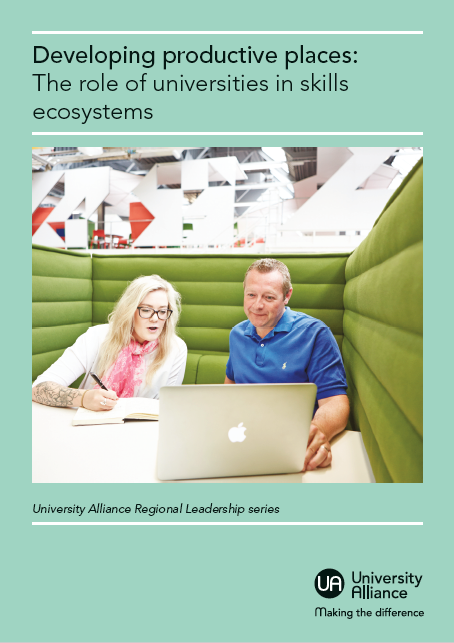Combined authorities should make the case for more levers to shape skills policy, boost productivity and develop regional strengths, working alongside higher education institutions to ensure they are used effectively, argues a new report by University Alliance.
In May 2017 directly elected mayors will take up their posts in cities across England for the first time. The report suggests that mayors could act as LEP Chairs to link up decision making with economic actors and that skills audits should be carried out in combined authorities to map both the existing skills base and the needs of local economies.
This will mean that metro mayors can bring a sharper focus on meeting strategic needs in the long term, in areas such as STEM, with the potential for new ways of funding and supporting skills provision to meet local needs and back growing industries.
The report argues that if growth schemes like the Northern Powerhouse and Midlands Engine are to succeed, thriving skills ecosystems are essential. Universities have a key role to play: in delivering skills rich courses for a diverse range of students, including degree apprenticeships, recruiting and retaining graduates, supporting workforce development through Continuing Professional Development (CPD), knowledge exchange and applied research, as well as informal support such as sharing facilities.
It looks in detail at Greater Manchester where the workforce has a lower proportion of degree holders and a higher proportion of those without any qualifications than the UK as a whole, examining how universities are working with policymakers to address this historic skills deficit, and sets out a charter which identifies the feature of thriving skills ecosystems.
Last month, ministers published the government’s Skills Plan which outlined plans for a clear ‘technical route’, extending up to degree apprenticeship level. Recent machinery of government changes, which unite responsibilities for FE, skills and HE in the Department for Education, also offer a unique opportunity to better align skills policy with the work of universities.
Commenting, University Alliance Chief Executive Maddalaine Ansell said:
“If the government is serious about creating opportunities for everyone, in all parts of the country, and raising productivity, then skills need to be a far more prominent part of the Northern Powerhouse and Midlands Engine story. With the apprenticeship levy coming in next year, it is crucial that we focus on the high level skills which will make the difference, both in boosting life chances for individuals and strengthening the economy.
“And as metro mayors are set to take office in our cities and regions, now is the time for bold thinking on how we meet the skills challenge, with new ways of funding and sustaining investment in high-level skills. Universities are key partners in this agenda – strong links with growing sectors and firms of all sizes put them in an ideal position to link up employers, combined authorities and other actors in the regions.”
Notes to editors:
- The report, Developing Productive Places: The role of universities in skills ecosystems, can be found here.
- The government’s Post-16 Skills Plan was published in July 2016 alongside the Report of the Independent Panel on Technical Education led by Lord Sainsbury.
- In May 2017, elections for metro mayors are taking place in combined authorities which have agreed devolution deals, including Greater Manchester, Liverpool City Region, Sheffield City Region and the West Midlands.
- You can read Alliance universities case studies here.




